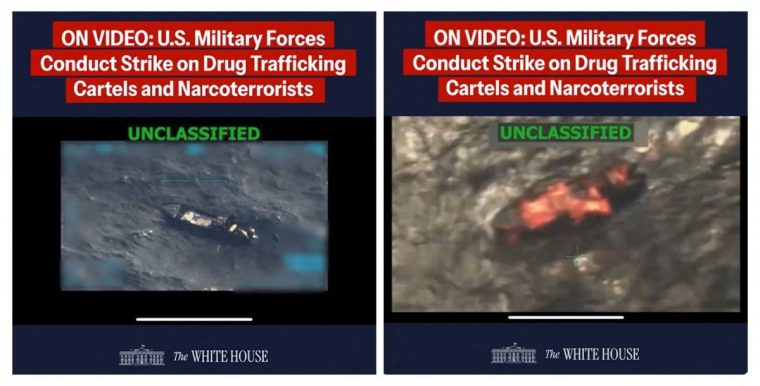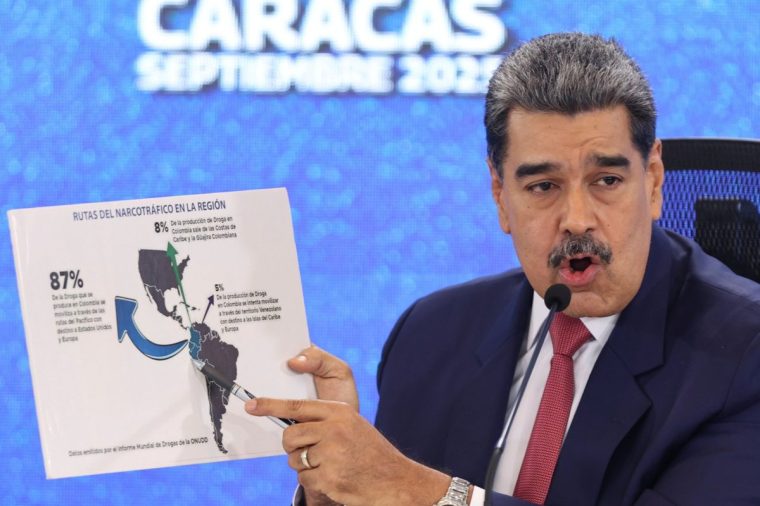Trump is threatening to expand military action by launching air strikes on ‘cartels coming by land’ – setting the stage for direct strikes on Venezuelan soil
War between the United States and Venezuela has edged closer. The Pentagon announced yet another extrajudicial strike on a speedboat that Secretary of War Pete Hegseth claimed was “without a doubt…trafficking narcotics”. Friday’s assault was the fourth such incident in a month, and the US government does not even pretend to claim that its actions are permissible under international law.
Without providing any supporting evidence, Hegseth took to social media to claim that the latest attack took place on Friday morning. He described it as a “lethal, kinetic strike on a narco-trafficking vessel affiliated with Designated Terrorist Organisations”, a presumed reference to Tren de Aragua, a Venezuelan criminal gang that the Trump administration accuses of conveying drugs to US shores.
While Hegseth’s social media post included a video showing a speeding boat being blown out of clear blue waters, the images failed to offer any confirmation of the vessel’s location, its destination, nor whether it was indeed laden with drugs. Hegseth claims “the strike was conducted in international waters just off the coast of Venezuela while the vessel was transporting substantial amounts of narcotics – headed to America to poison our people”. He also announced that four “narco-terrorists” aboard the boat were killed, but again provided no supporting evidence. The world is simply required to take his word for it.
Friday’s strike came at the end of a week in which the White House officially notified Congress that President Donald Trump now considers his administration to be in “armed conflict” with multiple drug cartels from Latin America. “The United States has now reached a critical point”, Trump wrote in a notice to Congress obtained by The Washington Post. “We must use force in self-defence…against the ongoing attacks by these designated terrorist organisations”, he maintained.
But only on Tuesday, Trump had told reporters that his previous actions against three other maritime vessels were so successful that “we have absolutely no drugs coming into our country via water”. He argued that the lethality of his first air strikes had terrified the drug traffickers and entirely terminated the flow of narcotics via ocean-going vessels. What changed between Tuesday and Friday is unclear, but Trump continues to threaten the possibility of expanding his military action and launching air strikes on what he called “cartels coming by land”.

Were he to follow through on that threat, the stage would be set for possible strikes on Venezuelan soil. The US might seek to target sites allegedly engaged in the production of drugs, or transit points, or trucks and other vehicles. But any strike on Venezuelan territory would be a clear breach of the country’s sovereignty, and President Nicolas Maduro says he is preparing to declare a state of emergency to deal with Trump’s threats.
In a TV address last Monday, Maduro said he had completed a “consultation process” that would lead to the declaration of “a state of external unrest” and the need “to protect our people, our peace and our stability”. Maduro is wanted by the US on drug trafficking charges that he fervently denies, and the Americans are offering a $50m (£37m) reward for information leading to his arrest.

Top government officials in Caracas say Maduro will seek to defend the country’s sovereignty, independence and vital strategic infrastructure ahead of Trump’s threat to expand his military activity, though precise details of Venezuela’s plans have not been publicly disclosed.
On Capitol Hill, Trump’s critics are assailing his “notification” that the US is now engaged in “armed conflict” – a phrase for which there is no precise legal definition. On Friday, Senator Jack Reed, a Democrat from Rhode Island who serves on the Senate Armed Services Committee, said the document “offered no credible legal justification, evidence or intelligence”. He argued that “every American should be alarmed that the President can wage secret wars against anyone he chooses…the President cannot launch military campaigns and invent legal cover after the fact”.
Most Republicans on Capitol Hill are not breaking cover with the White House, despite the dangerous precedent that many military analysts believe Trump is creating. But one Republican who is criticising the President’s strategy, received a flea in his ear last month from Vice President JD Vance.
When Senator Rand Paul of Kentucky, a libertarian, tore into Vance’s defence of the initial 2 September strike on a speedboat, and noted that the alleged drug traffickers on board could have been apprehended along with their cargo, he asked rhetorically on social media whether the Vice President had “ever read To Kill A Mocking Bird. Did he ever wonder what might happen if the accused were immediately executed without trial or representation?”
Vance’s pithy response came on his social media account: “I don’t give a shit what you call it”, the Vice President wrote. He argued that “killing cartel members who poison our fellow citizens is the highest and best use of our military”.
